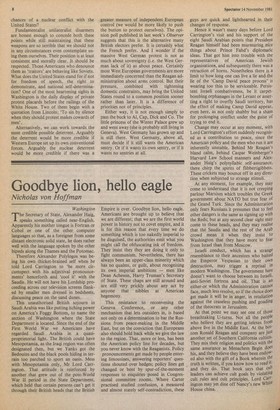Goodbye lion, hello eagle
Nicholas von Hoffman
Washington
The Secretary of State, Alexander Haig, speaks something called near-English. Apparently his mother tongue is Fortran or Cobol or one of the other computer languages so that, as a foreigner from some distant electronic solid state, he does rather well with the language spoken by the other bipeds along the Thames and the Potomac.
Therefore Alexander Polylogos was being his own thicket-brained self when he told Lord Carrington to 'be more circumspect with his adjectival pronouncements' henceforth and 'cool it' with the Saudis. He will not have his Lordship proceeding across our television screens flanked by smaller men dressed in bedsheets, discussing peace on the sand dunes.
This unauthorised British sojourn in Saudi Arabia was like putting itching power on America's Foggy Bottom, to name the section of Washington where the State Department is located. Since the end of the First World War we Americans have regarded Saudi Arabia in a quasiproprietorial light. The British could have Mesopotamia, as the Iraqi region was often designated then, but we Yanks got the Bedouins and the black pools hiding in terrain too parched to sport an oasis. Mess with Mesopotamia only, Mr Lord Carrington. That attitude is reinforced by another that grew out of the post-World War H period in the State Department, which held that certain persons can't get it through their British heads that the British Empire is over. Goodbye lion, hello eagle. Americans are brought up to believe that we are different; that we are the first world power in history not to covet empire, and it is for this reason that every time we do something which is too nakedly imperial to be disguised, the authorities emit what you might call the obfuscating ink of freedom. They insist they they are doing it only to fight communism. Nevertheless, there has always been an upper-class minority which has no qualms, or guilt, about recognising its own imperial ambitions — men like Dean Acheson, Harry Truman's Secretary of State. These chaps are still around and are still very prickly about any act by anyone that nibbles at American hegemony.
This resistance to reconvening the Geneva Conference, or any other mechanism that lets outsiders in, is based not only on a determination to bar the Russions from peace-making in the Middle East, but on the conviction that Europeans also should hold back while we give the law to the region. That, more or less, has been the American policy line for decades, but you never know with the Reaganists. Policy pronouncements get made by people entering limousines, answering reporters' questions shouted over hedges; policy lines get changed or bent by spur-of-the-moment responses to enquiries posed in Congressional committee rooms. Where Carter practised studied confusion, a measured and almost stately self-contradiction, these guys are quick and lighthearted in their changes of response.
Hence it wasn't many days before Lord Carrington's visit and his support of the eight Saudi Arabian points that President Reagan himself had been murmuring nice things about Prince Fahd's diplomatic ideas. That got him into trouble with the representatives of American Jewish organisations, and subsequently there was a retraction of horns. Nonetheless there is a limit to how long one can live a lie and the lie of the 'Camp David peace process' is wearing too thin to be serviceable. Persistent Israeli combativeness, be it carpetbombing orphanages in the Levant or asserting a right to overfly Saudi territory, has the effect of making Camp David appear, even here, as not only shabby but a sham for prolonging conflict under the guise of trying to end it.
Change may occur at any moment, with Lord Carrington's effort suddenly recognised as a contribution to peace, since the American policy and the men who run it are inherently unstable. Behind Mr Reagan's bland calm, behind Caspar Weinberger's Harvard Law School manners and Alexander Haig's polysyllabic self-assurance, there chirp the spirits of flibbertigibbets. These crickets may bounce off in any direction when subjected to strange stimuli.
At any moment, for example, they may come to understand that it is not creeping parlour Marxism which troubles the Greek government about NATO but true fear of the Grand Turk. Since the Administration only fears Russians it presumes that to feel other dangers is the same as signing up with the Reds; but at any second clear sight maY come to these heads, and they may realise that the Saudis and the rest of the Arab crowd mean it when they insist to Washington that they have more to fear from Israel than from Moscow.
Israeli conduct, which has a strange resemblance to their ancestors who baited the Emperor Vespasian to their own destruction, may trigger a reprisal in modern Washington. The government here doesn't want to choose between its Israeli, anti-Soviet fortress and oil. That is an either-or which the Administration cannot face, much less resolve, so if the choice does get made it will be in anger, in retaliation against the ceaseless pushing and goading of the theocrats in Jerusalem.
At that point we may see one of those breathtaking U-turns. Not all the people who believe they are getting telexes frorn above live in the Middle East. At the bottom Ronald Reagan and company are just another set of Southern California cultists. They mix their religion and politics with the same assurance as Menachem Begin does his, and they believe they have been endowed also with the gift of a Book wherein the truth is written, if you know how to read it: and they do. That book says that cult leaders can achieve cult goals by violating cult rules and cult principles. Lord Carrington may yet dine off Nancy's new White House china.


































 Previous page
Previous page